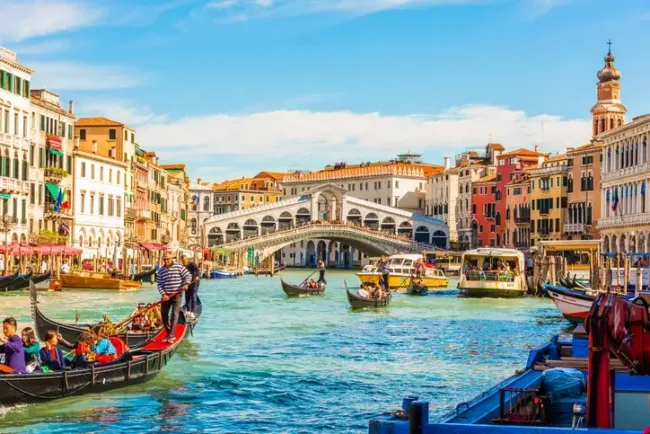
Italy
Welcome to Italy
Traveling to Italy? You may need a visa – find out if you do, which type, and how to apply so you can get the paperwork out of the way and focus on your trip.

What's an Italy Schengen Visa, and who's it for?
Who's the Italy Schengen Visa for? Travelers from over 100 eligible countries can apply for an Italy Schengen Visa.
Who's not eligible for the Italy Schengen Visa? Residents of the European Union and nationals of Schengen countries can travel visa-free within the Schengen Zone, as well as some other visa-exempt nationals.
What's the purpose of the Italy Schengen Visa? The Italy Schengen Visa serves various purposes, including:
-
Tourism
-
Visiting family and friends
-
Making stopovers at an airport in the Schengen zone
-
Attending business meetings, conferences, or other business activities
-
Participating in short recreational courses
-
Play sports
How long can you stay with an Italy Schengen Visa?
The visa allows a stay of up to 90 days within 180 days in the Schengen Area. Its validity ranges from 180 days to 5 years, as determined by the embassy based on your personal circumstances.
Learn more about the Italy Schengen Visa
What's an Italy ETIAS, and who's it for?
Who's the Italy ETIAS for? Travelers from countries that don't need a visa to visit Italy and other participating countries.
Citizens from over 60 visa-exempt countries must apply for ETIAS authorization, including the United States, the United Kingdom, Canada, Australia, New Zealand, Brazil, Japan, and Singapore.
Who's not eligible for the Italy ETIAS?
-
Citizens from countries requiring a visa to enter the Schengen Area.
-
EU/EEA/Swiss citizens as they enjoy freedom of movement within the Schengen Area and don't need any visa or authorization.
-
Individuals with an outstanding entry ban or alert in the Schengen Information System.
-
Travelers who don't meet the security and entry criteria the ETIAS system determines.
What's the purpose of the Italy ETIAS?
To pre-check travelers from visa-exempt countries before they enter participating countries, including Italy, for security reasons and to make the entry process quicker and easier.
How long can you stay with an Italian ETIAS?
The ETIAS authorization allows for short-term visits, typically up to 90 days within 180 days. It's valid for multiple entries within 3 years or until the end of the validity of the passport registered during the application, whichever comes first.
We'll update this page as soon as ETIAS is implemented in 2025.
What are Italy's long-term visa options?

Italy offers several long-term visa options for various purposes, such as employment, study, business, and residence. Here are some of the most common visas for Italy:
-
Working Visa: Non-EU citizens wanting to work in Italy must get a work visa and, once in Italy, convert the visa into a residence permit for work purposes.
-
Study Visa: Study visas allow long-term study, vocational training, or internships.
-
Family Reunion Visa: Those who want to reunite with relatives with residency in Italy can apply after being issued the no-impediment (“nulla osta”) by relevant Italian authorities.
-
Re-entry Visa: This is for people who have already received a Permit of Stay in Italy and have remained outside Italian territory beyond the expiry of the Permit.
-
Other visas: Italy also offers visas for medical treatment, adoption, transit, transport, and more.
At iVisa, we currently don't offer the above visas, but you can find out more on the Italian government website.
Staying healthy in Italy: Here's what you need to know
Rest assured, you'll find excellent public and private medical facilities throughout Italy. Here's what travelers should know.
Make sure to stay updated on routine vaccines
- Keep updated with Italy's COVID-19 requirements, such as quarantine, testing, or vaccine certificates, through your airline or the Italian government website.
Medical facilities
-
Public hospitals offer high standards of care. However, private facilities may provide quicker access and more comfort for non-emergency issues.
-
Pharmacies are easily identifiable by a green cross sign. Pharmacists in Italy are highly qualified and can offer advice and over-the-counter medications for minor ailments.
-
For emergencies, dial 118 to reach medical services quickly. In tourist-heavy areas, you'll find that medical personnel often speak English.
Health insurance
We'd always recommend taking out health insurance before you travel anywhere from any destination.
All the major cities in Italy will have private medical care, but it can be expensive. You should choose travel insurance with high coverage limits.
Contact your insurance provider before traveling to ensure you have the right level of coverage.
Other things to consider:
-
Trip cancellation, delay, and interruption benefits.
-
Medical expenses and medical evacuation benefits.
-
Baggage coverage.
Things to be aware of when visiting Italy
Keep an extra eye on the following to keep healthy and safe during your trip to Italy:
1. Water quality: Tap water is typically safe to drink in Italy, but when in doubt, opt for bottled water.
2. Food safety: To prevent foodborne illnesses, consume freshly prepared foods and avoid unpasteurized dairy products.
3. Heat: Italian summers are beautiful but can bring intense heat. Heatstroke and dehydration are risks, so drink plenty of water and seek shade regularly.
Medication for personal use
Follow these tips to bring into Italy some over-the-counter medicines:
-
Declare all medications: Report all medications for personal use to customs authorities.
-
Original packaging: Always keep medicines in their original containers and transparent bags in your hand luggage.
-
Prescription or doctor's letter: Present the medical prescription issued by your doctor or other competent authority in English.
-
Check for restrictions: Call Italy's embassy to verify that all of your prescription(s) are legal to bring with you.
-
Quantity aligned with itinerary: Bring only a reasonable quantity that aligns with the duration of your stay to avoid complications.

 Australia ETA Online
Australia ETA Online
 United Kingdom ETA
United Kingdom ETA
 India Tourist eVisa
India Tourist eVisa
 Canada ETA Visa
Canada ETA Visa
 Turkey eVisa
Turkey eVisa
 Egypt eVisa
Egypt eVisa
 Singapore SG Arrival Card
Singapore SG Arrival Card
 Indonesia eVoa Visa
Indonesia eVoa Visa
 Aruba ED Card
Aruba ED Card


